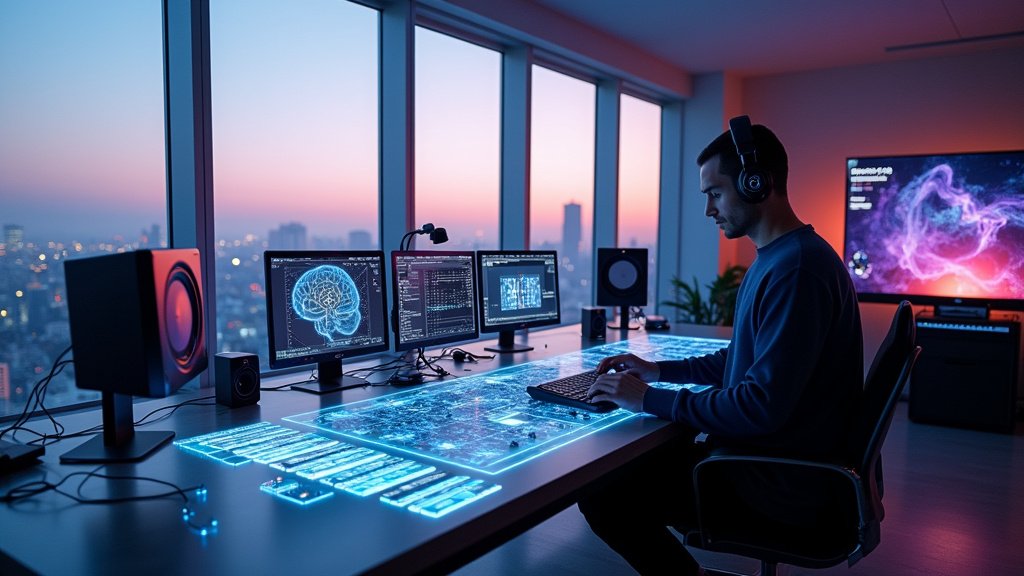In a world where technology, science, and art continually converge, the landscape of music news on Saturday, September 27, 2025, reflects a dynamic interplay of innovation and enduring human connection. From the artificial intelligence reshaping how music is made and consumed to profound discoveries about music’s impact on the human brain, and the reinvention of live performances, the day’s headlines offer a comprehensive view of music’s pervasive influence across all forms of entertainment.
The AI Ascendancy in Music Creation and Consumption
Artificial intelligence continues its relentless march through the music industry, presenting both unprecedented creative opportunities and significant challenges. YouTube has unveiled a suite of AI-powered tools designed to empower creators. The ‘Extend with AI’ feature for Shorts, launched September 26, 2025, allows creators to generate new video segments and AI-assisted music videos by combining AI-generated visuals with tracks from YouTube’s audio library. Complementing this, YouTube Labs is beta-testing AI-generated music hosts within YouTube Music, offering trivia and commentary to enhance the listening experience. This move positions YouTube to compete with AI tools already present on platforms like Spotify, though it also raises concerns about data privacy and content authenticity.
Beyond consumption, AI is fundamentally altering music creation. Platforms like Suno and Udio are making sophisticated AI music generation accessible to a broad audience, prompting discussions about the future of music production. McKinsey projects that AI could account for up to 20% of all music production by 2025, a trend that risks impacting income for human creators. A global study by CISAC indicates that music sector workers could lose nearly a quarter of their income to AI in the coming years, while generative AI markets are projected to grow exponentially. New roles such as ‘music designers’ and ‘AI voice agents’ are emerging as the industry grapples with the implications of AI potentially replacing human jobs.
Scientific Harmonies: Music’s Profound Effect on the Brain
Parallel to technological advancements, scientific research continues to illuminate the intricate relationship between music and the human brain. A recent study from the University of Jyväskylä highlights how musical expertise shapes auditory perception, affecting how the brain processes musical boundaries. Further research explores music’s broader cognitive benefits: familiar music can enhance concentration and learning, while emotionally charged music can reshape existing memories, suggesting potential therapeutic applications for conditions like PTSD and depression.
Neuroscientists at Stanford’s Wu Tsai Neurosciences Institute are exploring how music can amplify the effects of transcranial magnetic stimulation (TMS), a technique used for brain research and treating neuropsychiatric disorders. By synchronizing TMS pulses with musical rhythms, researchers have found they can significantly boost motor activity and potentially enhance treatments for depression and other neurological conditions. These studies underscore music’s powerful role in emotional regulation, memory encoding, and overall cognitive function.
Reinventing Live and Classical Music Experiences
The future of live music and classical music is being actively reimagined. Vertigo Live, in partnership with Visa, is redefining music experiences by offering exclusive, cinematic, and intimate performances to premium Visa cardholders. These limited-capacity events, set in visually stunning locales, are designed as cinematic experiences first, complete with exclusive digital content via the POCKET CONCERTS® platform.
Simultaneously, classical music is experiencing a vibrant renaissance driven by younger generations. Gen Z and Millennials are engaging with classical music through TikTok trends, VR concerts, and ambient study mixes, making it more accessible and ‘cool’ than ever before. While funding remains a concern, innovative approaches like VR concerts, AI integration, and collaborations with electronic artists are attracting new audiences and diversifying the genre. This modern interpretation is not merely about tradition but about connecting with values of authenticity, emotional depth, and meaningful experiences.
Anecdotes, History, and Enduring Legacies
Amidst these larger trends, personal stories and historical echoes add depth to the music news cycle. In a heartwarming display of mentorship, Elton John playfully gifted singer Lola Young his house keys after a bet about her song’s chart performance, a moment captured and shared as compelling 2025 content. On a more somber note, a historical artifact, a “famous Nazi spy radio,” has gone on display, reminding audiences of music’s complex role in historical propaganda. Research highlights how the Nazis weaponized music to control the populace and alienate specific groups, banning ‘degenerate’ art and promoting nationalistic anthems. The Volksempfänger, or ‘People’s Receiver,’ an inexpensive radio designed by Goebbels’s ministry, dramatically expanded the reach of Nazi propaganda.
In another heartwarming fan interaction, Trent Reznor of Nine Inch Nails provided free concert tickets to a 70-year-old fan battling aggressive breast cancer who had a lifelong wish to see the band perform. Meanwhile, a peculiar mention of a prehistoric crocodile being named after Lemmy Kilmister adds a touch of the delightfully absurd to the week’s trending articles.
All Forms of Entertainment Intertwined
As September 27, 2025, draws to a close, the news paints a picture of a music industry in constant flux. The convergence of cutting-edge technology, scientific discovery, evolving audience engagement, and historical reflection underscores music’s indispensable role across all forms of entertainment and technology. The trends indicate a future where human creativity is augmented by AI, scientific understanding deepens our appreciation for music’s power, and live and classical music experiences continue to transform, ensuring music’s enduring resonance in the years to come.





